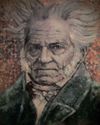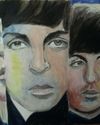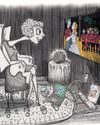Intentar ORO - Gratis
Ethics Goes Awry in Humans and AI
Philosophy Now
|August/September 2025
The Politics of Reincarnation in Tibet. Early Adopter of Kierkegaard & Tillich Dies

Human Ethics: Not Working as Expected
It is satisfying to find a scientific study not only quote but also confirm philosophical insights. Research published by Crystal Reeck of Temple University and Dan Ariely of Duke University is spearheaded by this quote by Aristotle: “The least initial deviation from the truth is multiplied later a thousandfold.” And this is exactly what they found. As opposed to Aristotle’s virtue ethics, which understands any single moral choice as embedded in a larger context, it is common for us in our everyday lives to conceive of any moral act as an isolated singular occurrence. At the same time, however, we are rewarded for little dishonesties, the ones that, in themselves, seem to matter little. They often don’t incur important consequences, but make our lives a little easier. Using a set of six experiments, the researchers demonstrated that “Individual dishonest acts are thus not independent events, but rather can compound and perpetuate pervasive unethical behaviour.” This moral detachment is expedited by factors such as unfair financial deprivation, self-serving rewards, and gradual change, while drawing attention to the importance to how of selfish acts matter can hinder it or slow it down. The authors conclude: “our findings suggest that dishonest acts can be super-additive over time and lead to an increase of unethical behaviour to the point where it becomes pervasive and routine.”
AI Medical Ethics: Not Working Quite as Hoped
Esta historia es de la edición August/September 2025 de Philosophy Now.
Suscríbete a Magzter GOLD para acceder a miles de historias premium seleccionadas y a más de 9000 revistas y periódicos.
¿Ya eres suscriptor? Iniciar sesión
MÁS HISTORIAS DE Philosophy Now

Philosophy Now
Pharmaco-Metaphysics?
Raymond Tallis argues against acidic assertions, and doubts DMT discoveries.
7 mins
August/September 2025

Philosophy Now
Nine Spiritual Exercises
Massimo Pigliucci explains how to get Philo-Sophical.
3 mins
August/September 2025

Philosophy Now
Books
We follow mammal's search for meaning, as Mark Vorobej savages John Gray's book of impractical cat philosophy, while B.V.E. Hyde ponders the point of Jordan Peterson. In Classics, Hilarius Bogbinder reviews Plato's Republic.
21 mins
August/September 2025

Philosophy Now
The Centennial of the Scopes ‘Monkey’ Trial
Tim Madigan on the creation and the evolution of a legend.
14 mins
August/September 2025

Philosophy Now
Gödel, Wittgenstein, & the Limits of Knowledge
Michael D. McGranahan takes us to the edge of language, mathematics and science.
10 mins
August/September 2025

Philosophy Now
Weltschmerz and the World
Ian James Kidd takes a realistic and global view of the history of pessimism.
10 mins
August/September 2025
Philosophy Now
What Makes A Work Of Art Great?
Each answer below receives a book. Apologies to all the entrants not included.
16 mins
August/September 2025

Philosophy Now
The Beatles: Nothing is Real
Clinton Van Inman gets back to the psychedelic Sixties.
4 mins
August/September 2025

Philosophy Now
The Post-Truth Kerfuffle
Susan Haack, who is Distinguished Professor in the Humanities, Cooper Senior Scholar in Arts & Sciences, Professor of Philosophy, and Professor of Law, at the University of Miami, talks with Angela Tan about how and when we know.
11 mins
August/September 2025

Philosophy Now
A Crisis of Attention
Paul Doolan attends to our culture of attention demanding.
13 mins
August/September 2025
Listen
Translate
Change font size
